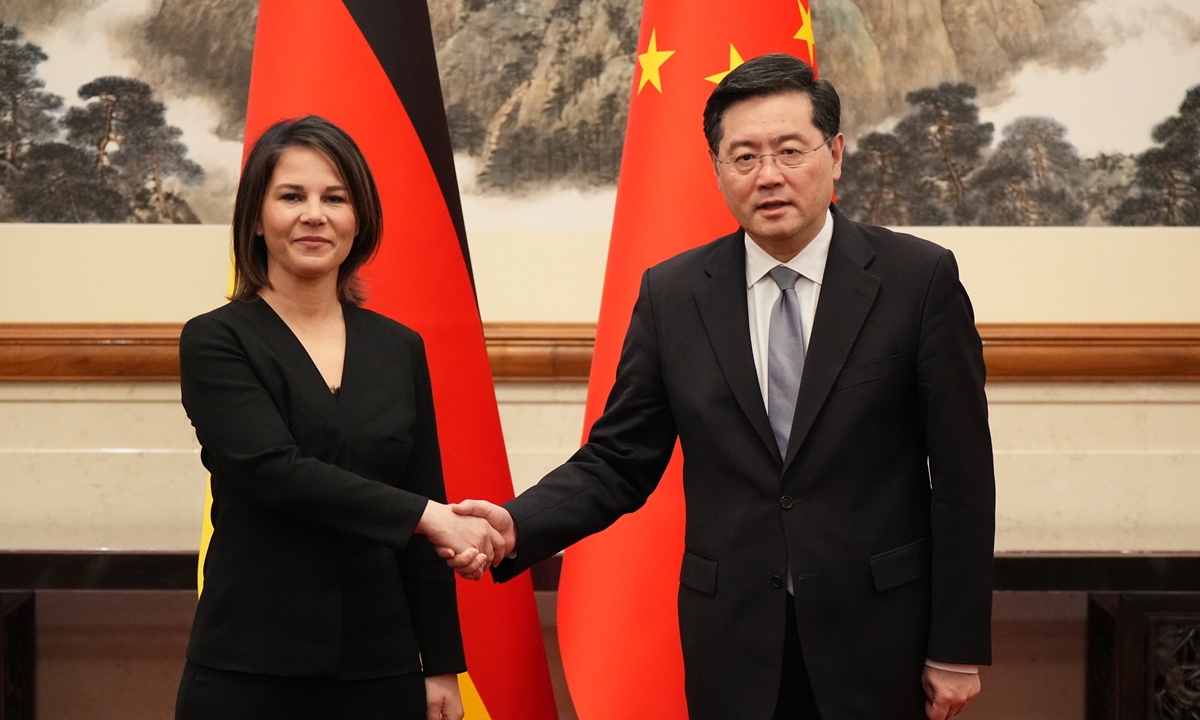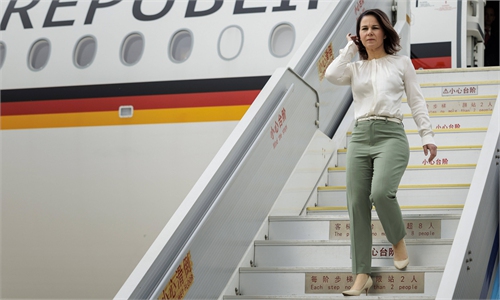Chinese, German FMs hold comprehensive, in-depth talks as Macron’s calls for Europe’s strategic autonomy make waves

Chinese State Councilor and Foreign Minister Qin Gang and visiting German Foreign Minister Annalena Baerbock shake hands at the Diaoyutai State Guesthouse in Beijing on April 14, 2023. Photo: IC
Chinese State Councilor and Foreign Minister Qin Gang and visiting Germany Foreign Minister Annalena Baerbock had comprehensive, candid and in-depth communication on Friday over China-Germany and China-EU relations as well as international and regional issues, as Macron's calls for Europe's strategic autonomy made waves within the continent and across the Atlantic.
While the differences between the two countries remain great, analysts shared the hope that through face-to-face communications, Germany, a major EU country, will deal with China based on its interests and pragmatism, as only by doing so can it blaze a sustainable and more independent trail with regard to its role in the EU and the world.
Qin and Baerbock on Friday visited German companies in Tianjin, and after taking a high-speed train to Beijing together, co-chaired the sixth round of China-Germany strategic dialogue on diplomacy and security.
China and Germany are partners, not rivals, Qin emphasized, pointing out that the key to sound development of bilateral relations lies in enhancing mutual trust and avoiding strategic misjudgments.
Qin called on Germany to formulate its China strategy based on the interests of the two countries and wellbeing of the two peoples. "China and Germany need cooperation, not confrontation, be it zero-sum or bloc confrontation."
Qin also said bilateral interdependence in the industrial chain is a result of economic globalization and the best choice under market rules. China-Germany trade has long accounted for 30 percent of the trade volume between China and Europe. A forced braking will be counterproductive and the losses would outweigh the gains, Qin said.
Qin also systematically elaborated on China's stance on the Taiwan question - peace and "Taiwan independence" cannot co-exist and it is China's internal affair that allows no external interference.
Baerbock repeated the necessity of "de-risking" instead of "decoupling" in the economic field. She reiterated support for the one-China policy while saying Taiwan's destabilization would be a "horror scenario."
The tone of Baerbock's remarks is not surprising given her party affiliation and past hawkish attitude toward China, analysts said.
Although Baerbock's trip may not warm up China-Germany relations, "its value lies in in-person exchanges and dialogue itself," showing the resumption of dialogue at various levels including strategic, business and trade, as well as culture and people-to-people, Cui Hongjian, director of the Department of European Studies at the China Institute of International Studies, told the Global Times.
It is believed that Baerbock, through the itinerary in Tianjin, can get a vivid and direct impression of China's development and China-Germany win-win cooperation, Wang Wenbin, Chinese Foreign Ministry spokesperson, said at Friday's routine press briefing.
Cui said that Baerbock, as a responsible foreign minister, is bound to learn about China carefully and understand the reality, value and significance of China-Germany relations.
Sun Keqin, a research fellow at the China Institutes of Contemporary International Relations, told the Global Times that a pragmatic approach toward China remains a consensus at the government level.
Baerbock's expressions also constitute a stark contrast to Macron's eloquent calls for Europe's strategic autonomy that have made waves within the continent and also across the Atlantic.
Cui noted Germany is currently engaged in a fierce domestic debate, if not struggle, between advocates for a transatlantic alliance and for strategic autonomy. There are also historical reasons that do not allow Berlin to be as outspoken as Paris on the issue of autonomy.
However, Cui underscored the importance of consistency and stability when Germany wants to demonstrate its own characteristics in foreign policy and is recalibrating its China strategy following the Merkel era. Germany should make changes "in a cautious and reasonable manner" rather than "change for change's sake."
Analysts predicted that voices on both sides would continue to emerge, which can inject positivity into the shaping of a healthy and more balanced public opinion on China in Europe.
A biased or tilted China view stems from insufficient communication and "the more truth is argued, the clearer it becomes."
Qin noted in his meeting with Baerbock that China and Germany are major countries with global influence, and the relations between the two countries have long gone beyond the bilateral scope. The two countries should jointly defend multilateralism and the basic norms governing international relations based on the United Nations Charter, strengthen coordination within multilateral frameworks, and join hands to tackle global challenges.
China and Germany have the responsibility and capability to be the guardians and propellers of globalization, and the two sides should oppose decoupling or severing industrial and supply chains, Qin said.

